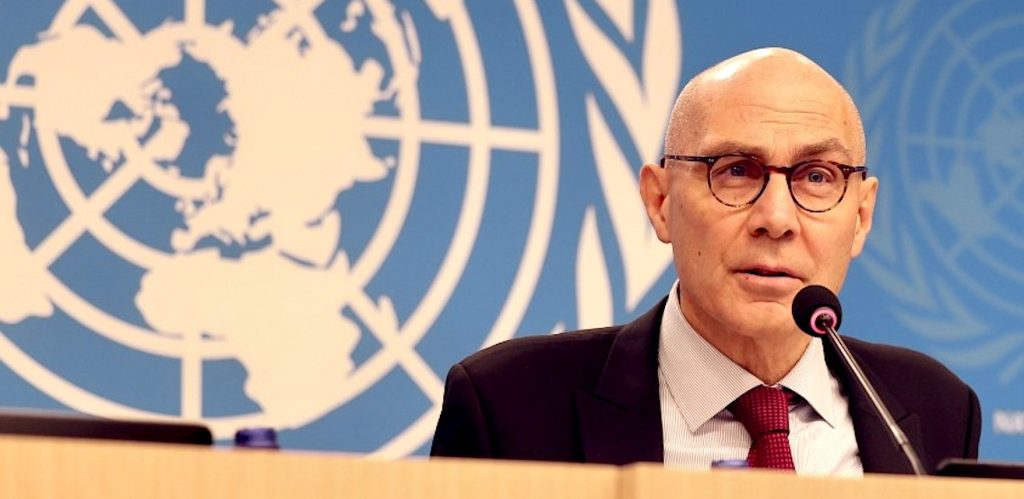Photo courtesy of OHCHR
As issues of international law dominate headlines globally, The UN High Commissioner for Human Rights Volker Türk is expected to visit Sri Lanka from June 23 to 26. He will meet President Anura Kumara Dissanayake, Prime Minister Harini Amarasuriya, other government officials and civil society groups in Colombo as well as visiting Jaffna, Trincomalee and Kandy.
UN Human Rights Council (HRC) resolutions over the years have, at international level, echoed concerns raised by Sri Lankans about unresolved abuses, past and present. In line with these, the Office of the High Commissioner has continued to monitor the situation. Another report to the HRC is due in September and some campaigners called for the visit to be postponed in case it biased the High Commissioner towards the government. But the UN has apparently assured one of the opposition party leaders that this will not happen.
In fact, top politicians are likely to feel uncomfortable being under the spotlight again. Although those in charge now are more responsive to ordinary people’s concerns and open to dialogue than the previous regime, progress has been worryingly inconsistent, even taking account of inherited and new problems and rhetoric not always matched by action. This not only intensifies hardship for those most vulnerable but also affects the leadership’s credibility with the risk of divisive and destructive politics again taking hold. A notable, though not catastrophic, drop in the vote share of the ruling NPP in May local elections, including a weaker performance in Jaffna, was a reminder of the need to deliver change.
Meanwhile global events have underlined the value of international humanitarian law and human rights law, imperfect as these may be, in holding the powerful to account and insisting on every human’s worth. Yet the difficulty in enforcing this if rulers of superpowers such as the US and Russia sponsor or commit even horrific large scale violation has also become clear. Nevertheless, when enough people take a shared stance on justice and rights for all, this can make a difference.
It would be unfair to downplay the efforts of those in or working with the government to improve the lot of those who are exploited, marginalised or at risk or indeed whose policy challenges have pushed it into doing better than it would have otherwise.
For instance, amid protests over the illegal seizure of land owned by Tamil farmers in Thaiyiddy, Jaffna, and construction of a Buddhist vihara, reports indicate that the Office of National Unity and Reconciliation managed to negotiate an agreement. All but the grounds on which the place of worship has been built will be returned while the rightful owners have generously agreed to allow this to remain while being compensated. Hopefully further land theft will be avoided although a case in the Supreme Courtover attempts to take over sizeable coastal areas by stealth is yet to be resolved.
This is an indication of the timidity of the NPP in the face of ethnic injustice by more communal minded sections of Buddhist clergy or the armed forces for which various reasons have been suggested. While it may take boldness to break with this tainted legacy, especially amidst fears of losing Sinhalese voters, there may be a higher cost later if this is not done, especially in view of grim lessons from recent history of how militarism can spill over and consume one’s own community.
Although the Sri Lankan situation is not a major item on the agenda for the 59th session of the HRC underway from June 16 to July 11, 2025, it is mentioned in the High Commissioner’s annual report. A report on implementation and enhancement of international cooperation in the field of human rights touches on the impact of the economic crisis, foreign debt obligations and IMF loans on several countries including Sri Lanka where the human cost remains high. There is a chance however that a push for change at a UN Financing for Development conference at the end of June might make a difference if enough people, groups and governments work together.
The Human Rights Commission of Sri Lanka, an official watchdog, has again highlighted the need to abolish the notorious Prevention of Terrorism Act after finding that the arrest of a Muslim pro-Palestinian protester was illegal. This drew attention to the repressive laws still in place. An open letter to Volker Türk signed by 65 social activists and civil society organisations from the North and East also calls for an end to present day repression against Tamils as well as abuses during and soon after the civil war. He was urged to visit the sites of mass graves as well as Mullivaikkal, where numerous people died during the final battles.
While confronting aspects of the past, as well as current imbalances of power and stark social inequalities, may be uncomfortable for the government, the desire of many people for change is largely what propelled it into office. Although the High Commissioner will be limited in what he can do during a short trip, it may well offer opportunities to hear directly from some of those most profoundly affected as well as encouraging the authorities to be bolder.
“In the face of heavy pushback, international courts, hybrid tribunals and domestic courts continue to advance international law and justice – on criminal responsibility for atrocity crimes; on State responsibility for human rights violations; on climate issues, and many other international legal questions of our time,” said Volker Türk on June 4. “The story of human rights – and of international law based on them – is of people pushing back against the cruelty, corruption and instability of arbitrary power by building, step by step, more just norms, which not only protect human dignity and strengthen justice, but also foster stability.”
Strengthening rights for Sri Lankans can not only protect people today and promote healing from past hurts and festering divisions but also play a part in creating a safer, more compassionate world.
